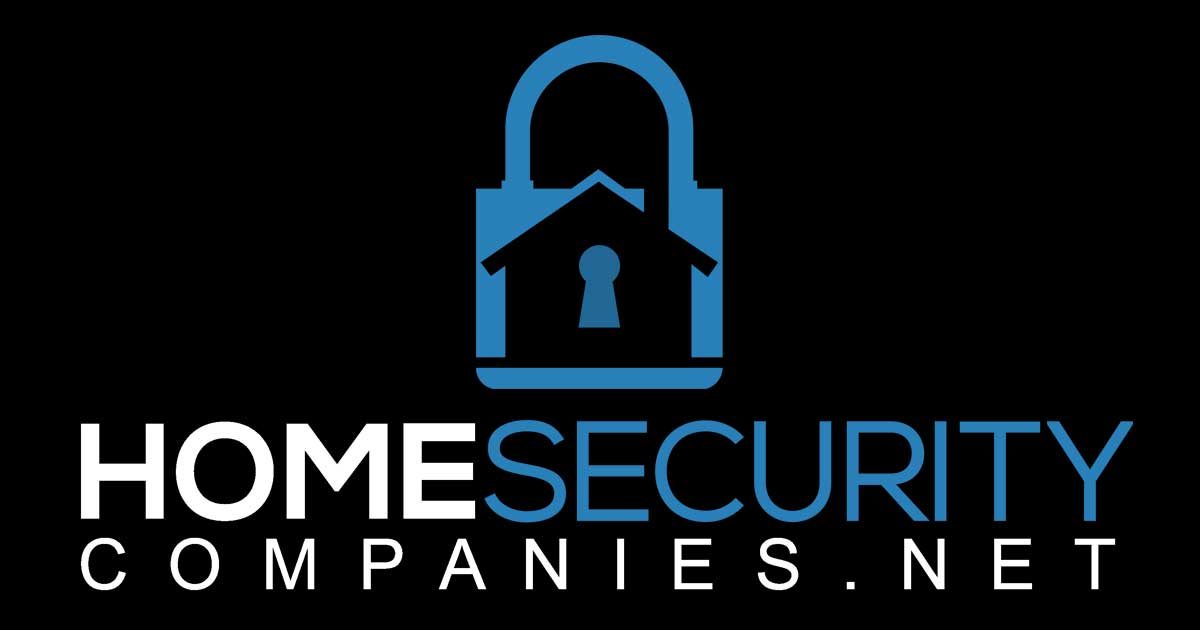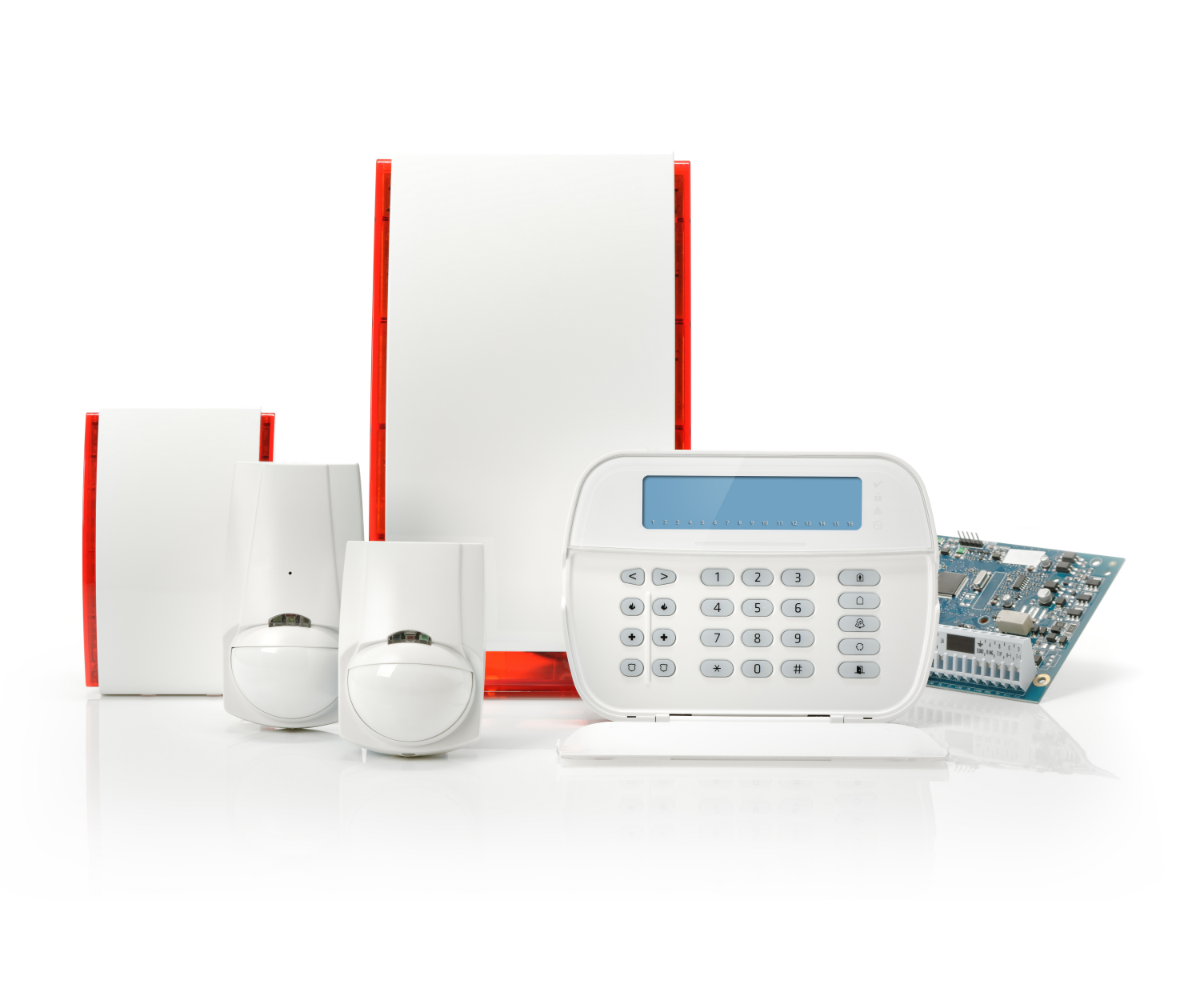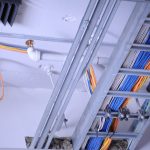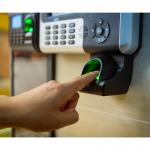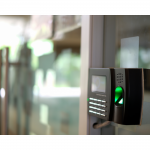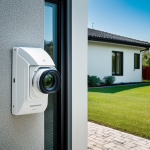As a home security specialist, I understand the importance of protecting your property and loved ones from potential threats. One of the most effective ways to do so is by installing an alarm system in your home.
Alarm systems come in various types and offer different features that can fit any homeowner’s needs. From basic door alarms to advanced smart home automation systems, plenty of options are available on the market today.
In this article, we will explore the different types of alarm systems you can choose from and provide guidance on selecting the right one for your home.
So whether you’re looking for a simple solution or want to invest in high-tech equipment, read on to learn more about how an alarm system can enhance your home security measures.
Basic Door Alarms
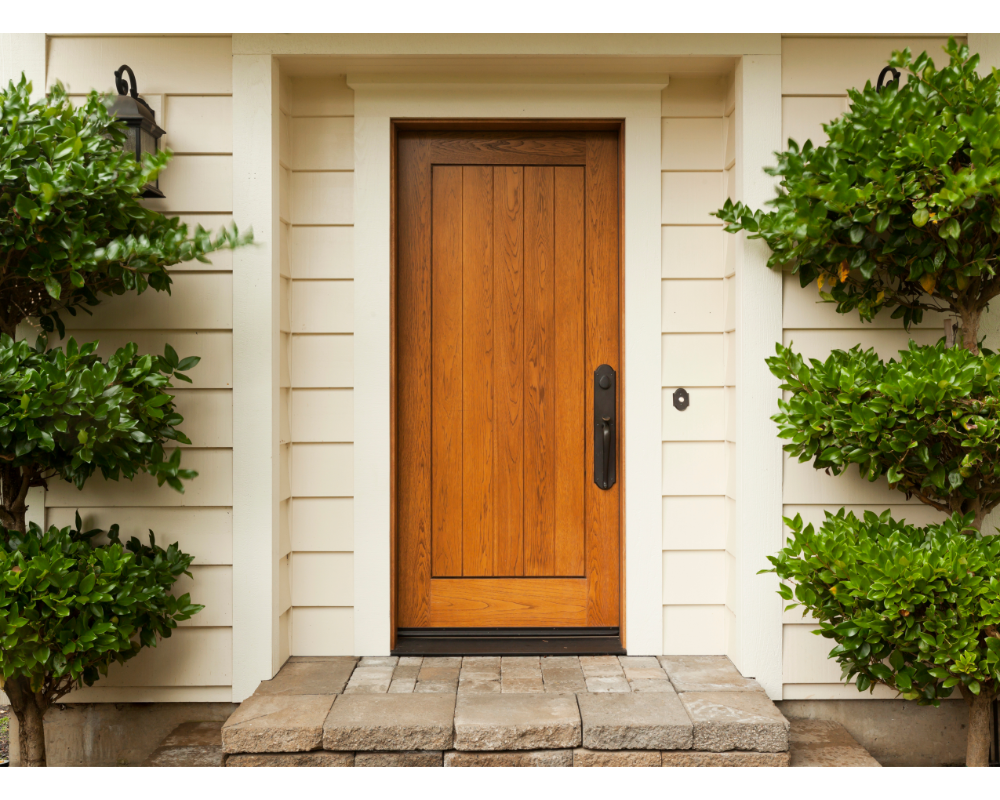
Did you know that homes without security systems are three times more likely to be burglarized than those with a system in place? This is why homeowners need to invest in basic door alarms as part of their home security equipment. These simple devices can provide an added layer of protection and peace of mind.
The installation process for most basic door alarms is straightforward, making them easy for homeowners to set up themselves. These alarms typically come with adhesive strips or screws for mounting onto the door frame or directly onto the door itself. It’s important to read the manufacturer’s instructions carefully before beginning installation and ensure the alarm is placed on a clean, dry surface.
To ensure your basic door alarms continue functioning properly, regular maintenance checks should be performed. Test the batteries weekly by pressing the test button on the device or by opening and closing the door while monitoring if the alarm sounds. Clean the sensors periodically using a soft cloth and check for any signs of wear or damage, such as cracks in the plastic casing or fraying wires.
By following these maintenance tips, you’ll help prolong the lifespan of your door alarm and keep your home secure.
Window Sensors
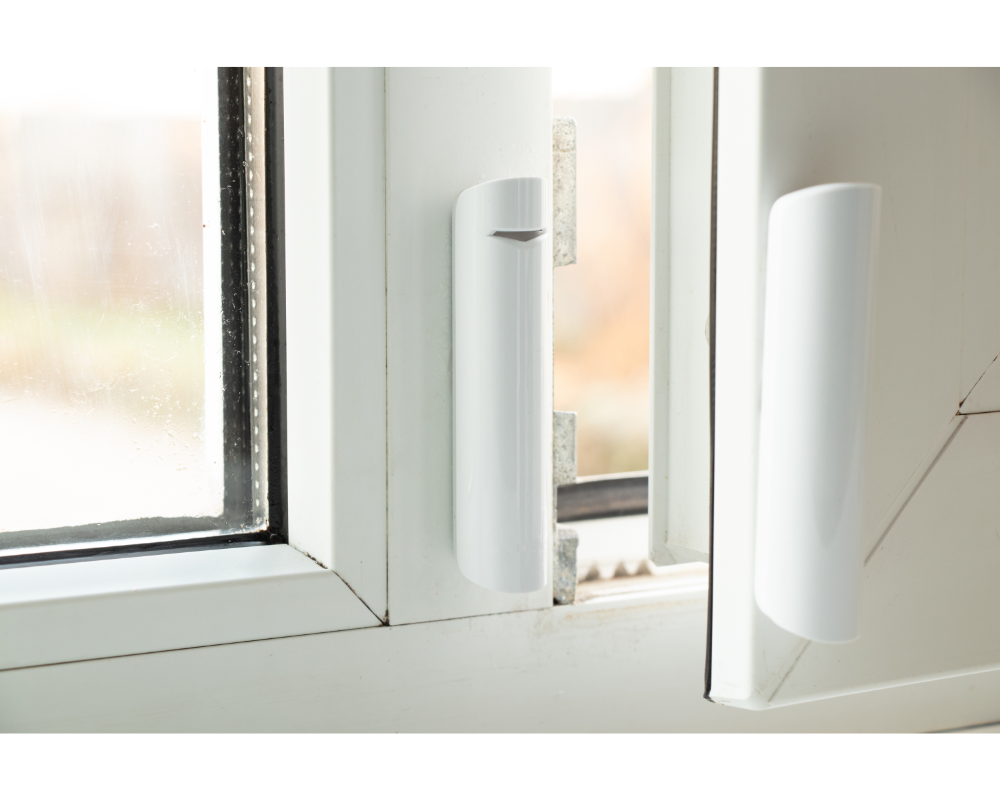
Moving on from basic door alarms, let’s talk about window sensors. Window sensors are another type of home security equipment that can help protect your home against intruders. These devices detect when a window is opened or broken and trigger an alarm.
One of the advantages of installing window sensors is that they provide an additional layer of security for your home. While door alarms may effectively deter burglars at entry points, windows often go overlooked as potential entryways. With window sensors in place, you can rest assured knowing that all possible entrances to your home are being monitored.
When it comes to placement strategies for window sensors, there are a few things to keep in mind. First and foremost, it’s important to have sensors installed on all ground-level windows and any windows accessible via balconies or other structures outside the house.
Additionally, consider placing sensors on any upper-level windows if they’re easily reachable from nearby trees or ledges. By strategically positioning your window sensors, you can maximize their effectiveness and ensure comprehensive coverage throughout your home.
Motion Detectors
Motion detectors are an essential component of any home security system. They can detect movement within a set range and sound the alarm if someone enters your property without permission.
Adjusting sensitivity is important because it determines how easily motion triggers the detector.
Placement considerations are also crucial for maximum effectiveness. Motion detectors should be placed in areas with an unobstructed view of the room or outdoor space they’re supposed to monitor. This allows them to pick up on movements that may otherwise go unnoticed, such as someone sneaking around outside.
When installing motion detectors, remember that pets and other animals can trigger false alarms. To avoid this issue, consider placing sensors at higher elevations so they don’t pick up on small animals or create dead zones near the ground level.
Proper placement and sensitivity adjustment will ensure that your motion detectors operate effectively and provide you with peace of mind knowing that your loved ones and property are safe from potential intruders.
Glass Break Detectors

After discussing motion detectors in the previous section, let’s move on to another crucial component of a home security system – glass break detectors. These devices are designed to detect the sound of breaking glass and alert homeowners of potential intruders.
Anachronism: Imagine you’re at home when suddenly you hear the sound of shattering glass. You immediately panic and wonder if someone is trying to break into your house. With a glass break detector installed, however, you can rest assured that any suspicious activity will be detected and reported.
The installation process for glass break detectors is straightforward and typically involves placing them near windows or other areas with a high risk of forced entry. Once installed, they provide several benefits for home security:
- Immediate detection: Glass break detectors can quickly identify any attempts at forced entry through broken windows.
- Enhanced deterrence: The presence of these devices is a deterrent for would-be burglars.
- Reduced false alarms: Unlike traditional alarm systems triggered by faulty sensors or pets, glass break detectors only respond to specific sounds associated with breaking glass.
- Increased peace of mind: Knowing that your home is equipped with reliable security measures helps give you greater confidence in protecting your family and property.
As a home security specialist, I highly recommend adding glass break detectors to your existing security system. By doing so, you take an important step towards safeguarding against potential threats and ensuring the safety of those closest to you. Don’t wait until it’s too late – contact us today to learn more about how we can help bolster your home’s defenses.
Smoke And Carbon Monoxide Detectors
I’m here to discuss the installation of smoke and carbon monoxide detectors in your home.
Smoke detectors should be installed on every level of the home and near each bedroom.
Carbon monoxide detectors should be installed in the hallway near each bedroom and the basement.
If you have any questions, don’t hesitate to ask me.
Installation Of Smoke Detectors
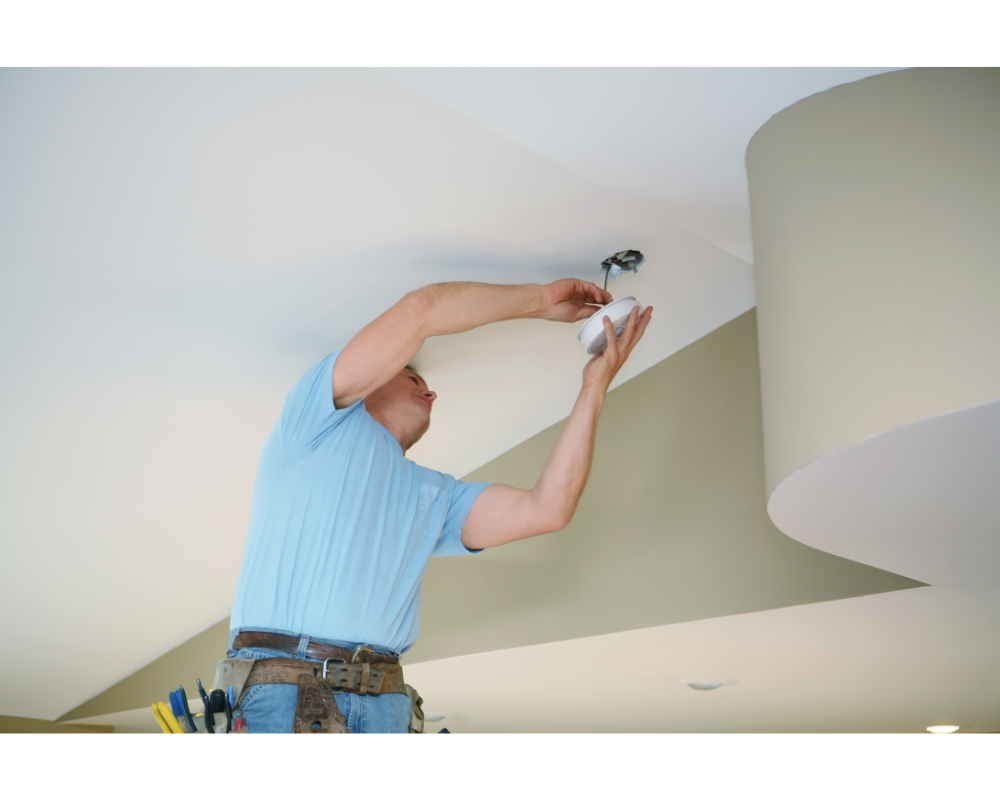
You can never be too safe when it comes to your home’s security. As a home security specialist, I know the importance of installing smoke detectors in every room of the house.
Smoke detector maintenance protects you and your family from potential fires. It’s essential to test them regularly, change their batteries at least once a year, and replace them every ten years.
One of the benefits of interconnected smoke detectors is that they all go off simultaneously if one detects smoke or fire. This feature ensures that everyone in the house will hear the alarm no matter where they are, giving them enough time to evacuate safely. Interconnected smoke detectors also provide an extra layer of protection by alerting you immediately if there’s a problem in another part of your property.
When it comes to installation, it’s best to hire a professional, as this guarantees proper placement and functionality. After installation, make sure to keep any flammable materials away from the detectors and vacuum around them often to prevent dust buildup that could interfere with their performance.
Remember: prevention is always better than cure!
Installation Of Carbon Monoxide Detectors
Now that we’ve covered the importance of smoke detectors let’s talk about another essential safety device for your home: carbon monoxide detectors.
Many people don’t realize how dangerous this odorless gas can be – it’s responsible for over 400 deaths per year in the United States alone! That’s why installing a carbon monoxide detector is crucial for keeping you and your family safe.
One common misconception about carbon monoxide (CO) detectors is that they’re only necessary if you have gas appliances or an attached garage. However, CO can come from any fuel-burning source, including wood stoves, fireplaces, and even candles.
Additionally, exposure to low levels of CO over time can cause health problems like headaches and nausea. That’s why I recommend installing at least one detector on every level of your home.
The benefits of having interconnected carbon monoxide detectors are similar to those of interconnected smoke detectors. If one goes off, they all go off simultaneously, alerting everyone in the house regardless of where they are located.
This feature ensures that everyone has enough time to evacuate safely. Some newer models also include digital displays that show the current CO levels in your home so you can take action before it becomes a serious problem.
Remember, early detection is key when it comes to protecting yourself and your loved ones from carbon monoxide poisoning!
Smart Home Automation Systems
When it comes to home security, smart home automation systems are becoming increasingly popular. These systems offer a wide range of integration benefits that allow you to control various aspects of your home from one central location.
From lighting and temperature settings to surveillance cameras and alarm systems, these devices make it easy for homeowners to monitor their property and keep their loved ones safe.
One of the most popular brands in this space is Amazon’s Echo line, which includes products like the Echo Dot and Echo Show. These devices feature Alexa voice control technology, allowing you to use simple voice commands to activate or deactivate alarms, turn lights on or off, adjust thermostats, and more.
Other notable brands include Google Home and Nest, as well as Apple’s HomeKit platform. Overall, investing in a smart home automation system can be an excellent way to enhance your home security measures.
With so many options available today, it’s important to research before making a purchase decision. Consider factors like brand reputation, compatibility with other devices in your home, ease of installation and operation, and any additional features or services offered by the manufacturer.
Video Surveillance Cameras
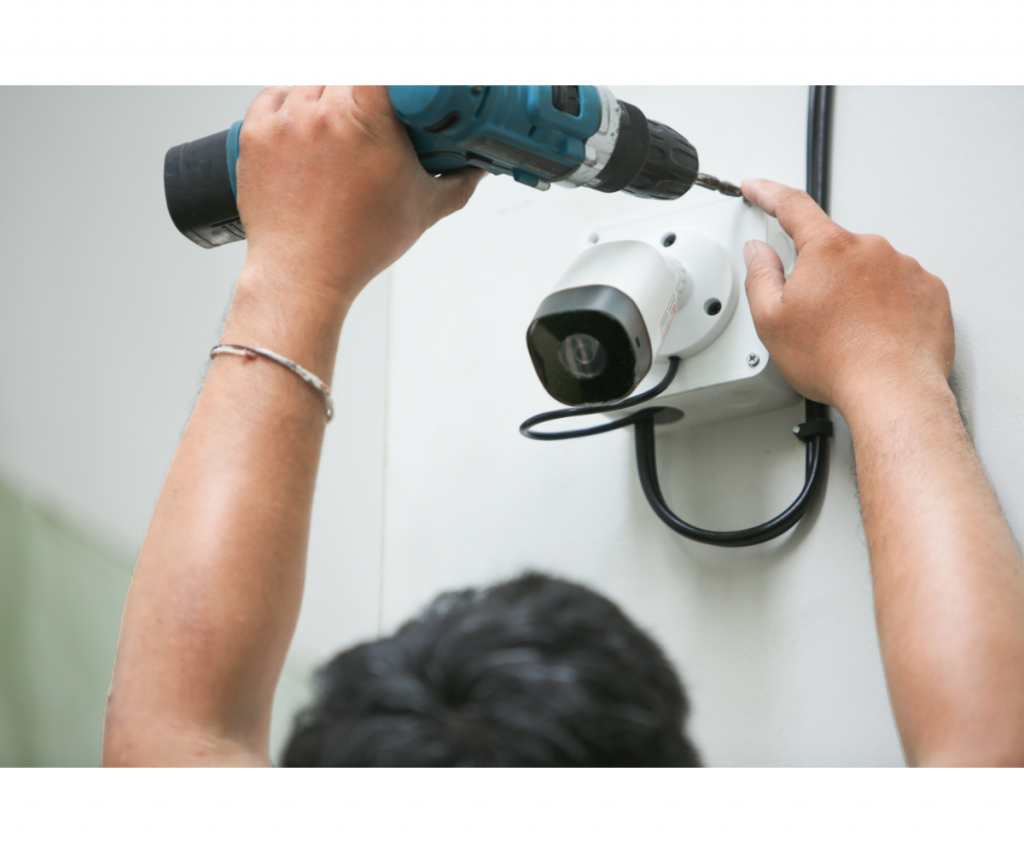
As the old saying goes, ‘A picture is worth a thousand words.’ And when it comes to home security systems, video surveillance cameras can provide an invaluable level of protection.
With advancements in technology, these cameras have become more than just a way to capture footage – they can now integrate with smart home systems for added convenience and control.
One consideration when choosing a video surveillance camera is whether to go with wired or wireless. Wired cameras are generally considered more reliable since they don’t rely on Wi-Fi signals that could be disrupted by interference or hacking attempts. However, installation can be more complicated and may require professional help. Wireless cameras offer easier installation and flexibility in the placement, but their reliance on Wi-Fi means there’s always the risk of connectivity issues.
Another benefit of integrating video surveillance cameras into your smart home system is the ability to monitor activity remotely. Whether at work or out of town, you can view live feeds from your cameras using your smartphone or another device. This feature allows for peace of mind knowing you can check in on your home anytime, anywhere.
Overall, video surveillance cameras add an additional layer of security to any home security system. By weighing the benefits and drawbacks of wired vs. wireless options and considering integration with smart home systems, homeowners can make an informed decision about which type of camera best suits their needs.
Panic Buttons And Emergency Alerts
Panic buttons and emergency alerts are two essential features of any home security system.
Panic buttons offer a fast and easy way to call for help in an emergency, such as a break-in or medical crisis. These devices can be installed throughout the house, including next to beds, on keychains, or even worn as jewelry.
The benefits of panic buttons are numerous. They provide peace of mind knowing that help is just a button press away, which can be especially important for seniors or people with health concerns. Additionally, they give homeowners control over their safety by allowing them to quickly summon assistance without having to fumble with phones or look up numbers during an emergency.
Training for emergency alerts is also crucial for any homeowner who wants to ensure maximum protection. Many home security companies now offer training sessions that teach users how to respond appropriately in different scenarios, from intruders breaking into the home to natural disasters like earthquakes or fires. By learning what actions to take ahead of time, homeowners can reduce their stress levels during emergencies and make informed decisions about how best to protect themselves and their loved ones.
Professional Monitoring Services
Regarding professional monitoring services, response times are an important factor. I always advise clients to look for monitoring services with the fastest response times – this will give you the most peace of mind.
Fees also play a role in selecting the right monitoring service. Some services may offer lower fees but slower response times, so finding the right balance is important.
I’m confident that with the right monitoring service, you’ll have the peace of mind that professionals are watching over your home. With the right monitoring service, you’ll have the assurance that any security threats will be responded to promptly. With the right monitoring service, you can be sure that your home and family are always safe and secure.
Monitoring Fees
As a home security specialist, I often get asked about the differences between DIY and professional monitoring services. One of the biggest factors to consider is the cost comparison of monitoring fees.
While DIY systems may seem more affordable upfront, they require you to monitor your own system, which can be time-consuming and potentially dangerous in emergency situations.
Professional monitoring services offer around-the-clock surveillance by trained professionals equipped to handle any situation that arises. However, this level of service does come with a monthly fee for their expertise and resources. The cost comparison of monitoring fees will vary depending on the provider, but it’s important to weigh the benefits against the expenses.
When considering whether or not to opt for professional monitoring services with alarm systems, it’s crucial to factor in the peace of mind that comes with knowing your home is being monitored at all times. In addition to providing an added layer of protection in case of emergencies such as break-ins or fires, these services can also help reduce false alarms and increase response times from first responders.
Ultimately, while DIY setups may appear cheaper initially due to the lack of ongoing costs, investing in professional monitoring can prove invaluable when it comes to keeping your loved ones safe and secure.
Response Times
Now that we have discussed the cost comparison of monitoring fees between DIY and professional monitoring services let’s talk about another important factor to consider when it comes to home security: response times. Response time refers to how quickly emergency personnel can be alerted and dispatched in case of a break-in or other emergency situation.
Several factors affect response times, such as the location of your home, the quality of your alarm system, and the efficiency of your chosen monitoring service. For instance, if you live in an area with high crime rates and slow police response times, investing in a reliable monitoring service is crucial for quick intervention during emergencies.
When it comes to home security, every second counts. The importance of quick response cannot be overstated enough. A few seconds’ delay can mean the difference between life and death in case of fire or burglary.
This is why choosing a professional monitoring service with fast response times should be at the top of your priority list when considering options for securing your home.
In summary, while cost comparison is an essential factor to consider when deciding whether to opt for DIY or professional monitoring services, don’t forget about response times- which could make all the difference in ensuring safety and security for yourself and your loved ones. Quick responses are critical in providing adequate protection against any threats posed by burglars or fires.
Therefore homeowners must invest in reliable, professional monitoring services that offer swift actions aimed at safeguarding their homes against potential risks.
Peace Of Mind
As a home security specialist, I cannot stress the importance of peace of mind when securing your home. Professional monitoring services provide numerous benefits that contribute significantly towards achieving this goal.
From round-the-clock surveillance to quick response times in emergencies, these services are designed to give homeowners the assurance they need that their properties and loved ones are always protected.
One technique for achieving peace of mind is through remote access technology provided by professional monitoring companies. With this feature, you can monitor your property from anywhere using your smartphone or other mobile devices. This way, you can keep tabs on what’s happening in real time and receive alerts whenever there’s suspicious activity detected around your home.
Another benefit of peace of mind offered by professional monitoring services is the ability to customize settings based on individual needs. Homeowners can choose specific features, such as motion detectors or door sensors, based on their unique requirements. Additionally, some providers offer personalized packages tailored to fit different budgets and preferences- giving users more control over how much they pay for maximum protection without worrying about hidden costs.
In conclusion, investing in professional monitoring services guarantees fast response times and offers immense benefits like peace of mind. By leveraging advanced technologies and customizing service plans according to customer needs, homeowners can rest assured knowing their homes are well-protected against potential risks day and night.
Choosing The Right Alarm System For Your Home
When it comes to securing your home, installing an alarm system is a great investment. Not only do they provide peace of mind, but they also offer many benefits, such as deterring intruders and alerting authorities in an emergency.
However, with so many available options, choosing the right alarm system for your home can be overwhelming.
To start, consider the size and layout of your home. This will help determine how many sensors and alarms you may need. If you have multiple entry points or a large property, wireless systems that connect to a central monitoring station may be ideal. On the other hand, if you have a smaller space or are looking for cost-effective installation options, standalone alarms that sound off when triggered could work fine.
Another factor to consider is whether you want additional features, such as cameras or remote access through a mobile app. These added features can enhance security measures and allow for easy monitoring even while away from home.
It’s important to weigh these options against budget constraints and prioritize what is most essential for your specific needs. Overall, investing in an alarm system is an effective way to protect your home and loved ones from potential threats.
Frequently Asked Questions
How often should I test my alarm system?
As a home security specialist, I cannot stress the importance of regular alarm system maintenance enough.
Testing your alarm system should be done at least once a month to ensure it is functioning properly and to catch any potential issues before they become major problems.
Common issues with alarm system testing include false alarms or no response from the monitoring center. These can often be easily resolved by checking for low batteries or ensuring all sensors are properly aligned.
Don’t wait until an emergency situation arises to find out that your alarm system isn’t working correctly. Make testing a priority in your home security routine.
Are there any security systems that do not require a monthly fee?
Installing your own alarm system without professional help can be a tempting option for those looking to save money. However, before embarking on the DIY route, it’s important to consider some potential drawbacks.
While many helpful tips are available online for self-installation, it can still be a complex process that requires technical knowledge and experience. Without proper installation, your alarm may not function properly or fail when you need it most.
Additionally, relying solely on DIY installation means missing out on the expertise of a professional who can offer personalized advice and recommendations based on your specific needs and home layout.
As a home security specialist, I always recommend consulting with an expert before making any decisions about protecting your home and loved ones. Remember: safety should never come at the cost of cutting corners!
What happens if my alarm goes off while I’m away?
If your alarm system goes off while you’re away, don’t panic. Most systems have a response protocol in place to alert the authorities and notify you of the breach.
However, false alarms can be a nuisance for you and emergency services. To prevent false alarms from occurring, ensure all sensors are properly installed and maintained, avoid placing objects near motion detectors that may trigger them accidentally, and consider investing in a system with advanced technology such as video verification or smart home integration.
As a home security specialist, my top priority is ensuring the safety of your home and family, so always take any alarm seriously and contact your provider if you have any questions or concerns.
Are there any security systems that do not require a monthly fee?
Looking for a security system that doesn’t require a monthly fee? You’re not alone. Many homeowners want the peace of mind that comes with DIY home security but don’t want to be tied down by ongoing payments.
The good news is that plenty of options are available, from wired to wireless alarm systems. When it comes to choosing between the two, it ultimately depends on your specific needs and preferences.
Wired systems may offer more reliability and stability but can be harder to install and customize. Wireless systems allow for easier installation and flexibility but may have occasional connectivity issues.
As a home security specialist, I recommend doing your research before making any decisions – read reviews, compare features, and consider hiring a professional if you need assistance with installation or customization.
Can I integrate my alarm system with my smart home devices?
Integrating your alarm system with smart home devices can provide numerous benefits, such as remote access and control of your security system.
However, compatibility concerns should be considered before making any changes to your current setup.
As a home security specialist, I highly recommend consulting with a professional before integrating your alarm system with smart home devices.
They can assess your current equipment and advise you on the best options for seamless integration without compromising the overall effectiveness of your home security system.
Peaceful Slumber: Finding Confidence in Your Home Alarm System
In conclusion, alarm systems are a crucial component of any comprehensive home security plan. It is recommended that homeowners test their alarm system at least once per month to ensure it is functioning properly. While some may attempt to install their own system without professional help, it is highly recommended to seek the assistance of a licensed technician.
In terms of affordability, there are many options available for security systems that do not require monthly fees. One example is the SimpliSafe Home Security System which offers customizable packages and no contracts or hidden fees. Additionally, integration with smart home devices such as Amazon Alexa or Google Assistant can provide added convenience and control over your home security.
At XYZ Security Solutions, we understand the importance of protecting your home and loved ones. That’s why our team of experts works tirelessly to create customized solutions tailored to your needs. Whether you’re looking for basic entry-level protection or advanced features like live video monitoring, we have something for everyone.
Contact us today to learn more about how we can help secure your home.
